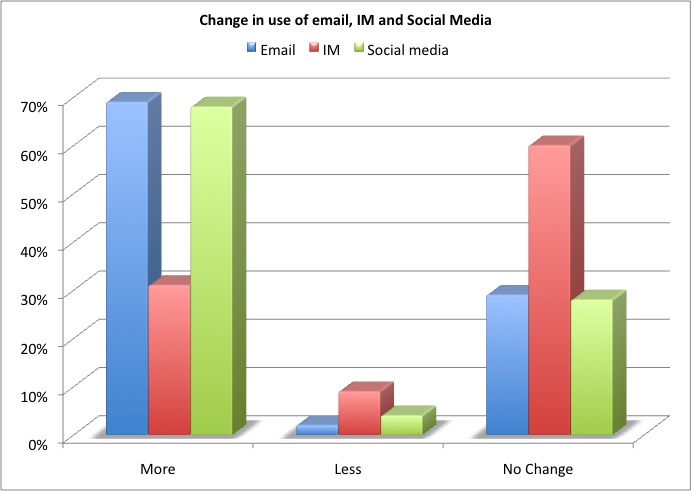The death of the inventor of email prompted several authors and producers to reflect on not only the future of email but also letters .
.
2. The future of email – the BBC put together a short piece for NewsNight about whether or not email will survive another 30 years. Probably, yes but hopefully we will be making better use of alternatives for both sharing and sending short ephemeral communications.
3. What might the world with less email look like? Alexandra Samuel provides a very good and practical insight and reviews the good and bad side of using alternatives to email and especially from the perspective of archiving material.
4. Lost in digitisation? As if reading Alexandra’s thoughts, Robert Shrimsley in the Financial Times questions what treasures will remain if we no longer either write with pen and paper or worse still use social media sights where the message/photo disappears once seen (like Snapchat). Will we still have any great letters and photos to help us form a picture of like in the 21st Century as our forefather left us a century earlier?
And
5. Stopping a potential email war. How does the response of ‘points noted’ strike you? Passive aggression or a very smart way to stop a potential email war?
6. Email with no regrets. Sadly an email sent is rarely if ever deleted. There is always someone somewhere who will have kept a copy and produce it just when you least expected. Here are some tips on how to minimise if not obliterate the need to feel remorse after sending an email.
Tags: Alexandra Samuel, BBC, Email war, future of email, Pasive Aggression, pen and paper, Ray Tomlinson, Robert Shrimsley
Radio interview with Alan Coote of Lets Talk Business
Lets Talk Business On-line January 2013
Tags: email management training, email overload, future of email
Early findings of new white paper on future of email (due out in February). Email celebrated its 41st birthday recently, yet despite its age new research shows that its use is unlikely to wane significantly for at least the next decade. What should be your email strategy?
Tags: email management training, email overload, future of email
The CIPD annual survey for well being shows that sick leave has fallen by nearly a day. Good news. The bad news is that stress and muscular skeletal problems (back pain RSI and eye strain) are two of the main reason for taking sick leave. Indeed cases of ‘ipad shoulder’ have now been reported. Email overload is still a major contributor to stress levels, not to mention the time spent at the inbox slumped over a keyboard which rises the risk of muscular skeletal problems.
Some postulate that email is in decline and hence we might hope that is email overload and it’s twin sister ’email stress’. The main reason given for the decline in email is the rise in use of social technologies like SharePoint, instant messaging (IM) and alike.
email is the rise in use of social technologies like SharePoint, instant messaging (IM) and alike.
Our recent survey on the ‘state of the inbox’ for the ITDF Autumn Conference revealed that email traffic is far from declining. Mesmo Consultancy like others are witnessing a dramatic increase. Business users now receive on average 77 emails per day which represents a rise of 26% over the last few years. Interestingly however, most feel that only 47% of these emails are necessary. Dealing with the unnecessary emails (excluding spam) is now costing organisations nearer 31 days per person per year in comparison to the 21 we witnessed a few years ago. So much for the push to lean and mean and improved efficiency.
Is your organisation paying too high a price for the pleasure of using email? Click here to check how much email overload is costing you in lost productivity.
So what of all the talk about social technologies being the nirvana to solve all the challenges which email possess? Our study revealed that about half the participants are using such technologies but they are not truly embedded in many as a replacement for email. Discussions at the ITDF supported this finding.

Haystacks by Monet
Social technologies bring with them their own set of challenges not least more emails as alerts to new postings etc. Then there is the information overload as more people feel they must share ever more information. It takes a skilled knowledge worker to pick out and pull in just what is really relevant. It’s akin to finding a needle in a haystack and is a skill few either possess or are taught.
Piling social technologies on top of email is not the solution. It just adds to the information overload and ramps up even further the stress and time we need to spend slumped over our keyboard.
One solution to driving down stress related sick leave is to implement such technologies as part of the information and communications strategy. However users must also be properly educate about when, where and how to use these technologies and email properly. Not surprisingly less than a third had any education and training in how to use effectively email and social technologies. (This is very similar to previous findings.)
We have commented on the effective use of IM and there will be more in the next blog. Meanwhile, we would be delighted to talk to you about how we can help you drive down and out the pernicious 21st century office disease of email overload and the associated stress.
Our current research into the future of email reveals that information overload is increasing. What is your organisation doing to help people use email and social technologies effectively to reduce email and information overload and hence time wasted at the computer?
Tags: email management training, email overload, email stress, future of email, Instant messaging, Mesmo Consultancy, social technologies